
What's Going On is the eleventh studio album by American soul singer Marvin Gaye. It was released on May 21, 1971, by the Motown Records subsidiary label Tamla. Recorded between 1970 and 1971 in sessions at Hitsville U.S.A., Golden World, and United Sound Studios in Detroit, and at The Sound Factory in West Hollywood, California, it was Gaye's first album to credit him as producer and to credit Motown's in-house session musicians, known as the Funk Brothers.

"I Heard It Through the Grapevine" is a song written by Norman Whitfield and Barrett Strong for Motown Records in 1966. The first recording of the song to be released was produced by Whitfield for Gladys Knight & the Pips and released as a single in September 1967. It went to number one on the Billboard R&B Singles chart and number two on the Billboard Pop Singles chart and shortly became the biggest selling Motown single up to that time.

"What's Going On" is a song by American singer-songwriter Marvin Gaye, released in 1971 on the Motown subsidiary Tamla. It is the opening track of Gaye's studio album of the same name. Originally inspired by a police brutality incident witnessed by Renaldo "Obie" Benson, the song was composed by Benson, Al Cleveland, and Gaye and produced by Gaye himself. The song marked Gaye's departure from the Motown Sound towards more personal material. Later topping the Hot Soul Singles chart for five weeks and crossing over to number two on the Billboard Hot 100, it would sell over two million copies, becoming Gaye's second-most successful Motown song to date. It was ranked at number 4 in Rolling Stone's 500 Greatest Songs of all Time in 2004 and 2010.
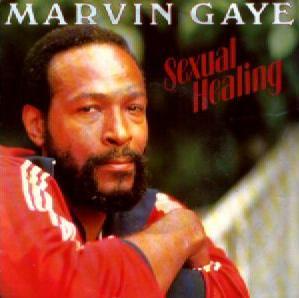
"Sexual Healing" is a song recorded by American singer Marvin Gaye from his seventeenth and final studio album, Midnight Love (1982). It was his first single since his exit from his long-term record label Motown earlier in the year, following the release of the In Our Lifetime (1981) album the previous year. It peaked at No. 3 on the Billboard Hot 100 and is listed at number 198 on Rolling Stone's list of 500 Greatest Songs of All Time. "Sexual Healing" is written and composed in the key of E-flat major and is set in time signature of 4/4 with a tempo of 94 beats per minute.

"Got to Give It Up" is a song by American music artist Marvin Gaye. Written by the singer and produced by Art Stewart as a response to a request from Gaye's record label that he perform disco music, it was released in March 1977.
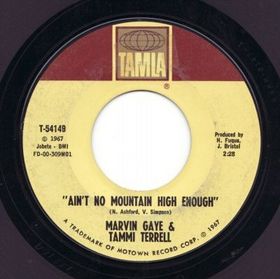
"Ain't No Mountain High Enough" is a song written by Nickolas Ashford & Valerie Simpson in 1966 for the Tamla label, a division of Motown. The composition was first successful as a 1967 hit single recorded by Marvin Gaye and Tammi Terrell, and became a hit again in 1970 when recorded by former Supremes frontwoman Diana Ross. The song became Ross's first solo number-one hit on the Billboard Hot 100 chart and was nominated for the Grammy Award for Best Female Pop Vocal Performance.

"I Want You" is a song written by songwriters Leon Ware and Arthur "T-Boy" Ross and performed by singer Marvin Gaye. It was released as a single in 1976 on his fourteenth studio album of the same name on the Tamla label. The song introduced a change in musical styles for Gaye, who before then had been recording songs with a funk edge. Songs such as this gave him a disco audience thanks to Ware, who produced the song alongside Gaye.
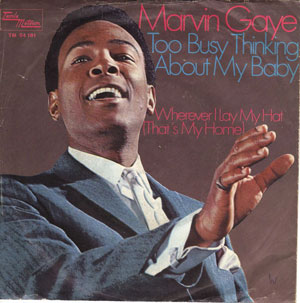
"Too Busy Thinking About My Baby" is a Motown song written by Norman Whitfield, Barrett Strong, and Janie Bradford. The song was first recorded by The Temptations as a track on their 1966 album Gettin' Ready. Eddie Kendricks sings lead on the recording, which was produced by Whitfield. Jimmy Ruffin also recorded a version with The Temptations providing background vocals in 1966. It remained unreleased until 1997.
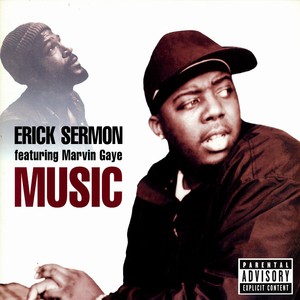
"Music" is a 2001 hit single by Erick Sermon featuring archived vocals from Marvin Gaye.
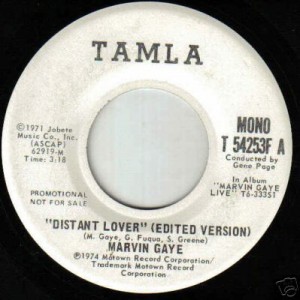
"Distant Lover" is the sixth song issued on singer Marvin Gaye's 1973 album, Let's Get It On and the B-side of the second single from that album, "Come Get to This". A live recording was issued as a single in 1974. The live version of the song was Gaye's most successful single during the three-year gap between Let's Get It On and his following 1976 album, I Want You.

Midnight Love is the seventeenth studio album by Marvin Gaye and the final album to be released during his lifetime. He signed with the label Columbia in March 1982 following his exit from Motown.

That Stubborn Kinda Fellow is the second studio album by Marvin Gaye, released on the Tamla label in 1963. The second LP Gaye released on the label, it also produced his first batch of successful singles for the label and established Gaye as one of the label's first hit-making acts in its early years.
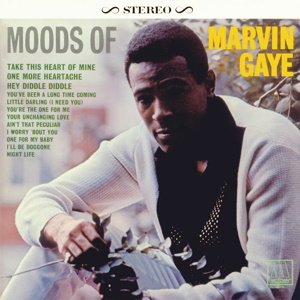
Moods of Marvin Gaye is the seventh studio album by Marvin Gaye, released on the Tamla label in 1966.
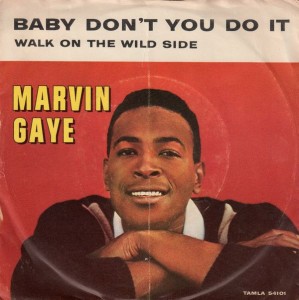
"Baby Don't You Do It" is a 1964 single by American singer Marvin Gaye. Released on the Tamla label, this song discusses a man who is at a standstill with his girlfriend, who he feels is neglecting his love stating "Don't break my heart/...I've tried to do my best".

Dream of a Lifetime is the eighteenth and first posthumously released studio album by the American recording artist Marvin Gaye. It included the top five R&B single "Sanctified Lady".

"I Wanna Be Where You Are" is a song written by Arthur "T-Boy" Ross and Leon Ware for Michael Jackson, who took the song to number 7 in Cash Box and number 16 on the Billboard Hot 100 pop chart. It also reached number 2 on the Billboard R&B singles chart in 1972.
"Baby, I'm for Real" is a soul ballad written by Marvin Gaye and Anna Gordy Gaye, produced by Marvin and recorded and released by American Motown vocal group The Originals for the Soul label issued in 1969.
"Let Your Conscience Be Your Guide" is the debuting single for singer Marvin Gaye, released as Tamla 54041, in May 1961. It was also the first release off Gaye's debut album, The Soulful Moods of Marvin Gaye, in which most of the material was the singer's failed attempt at making an 'adult' record compared to Motown's younger R&B sound.
"I Want to Come Home for Christmas" is a holiday song recorded by Marvin Gaye in 1972. The song was co-written by Gaye and Forest Hairston and was released on a posthumous Marvin compilation titled, The Marvin Gaye Collection 18 years later.














